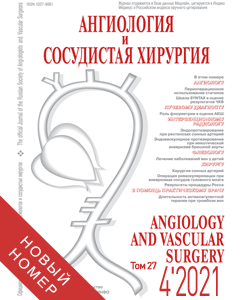Journal «Angiology and Vascular Surgery» •
2019 • VOLUME 25 • №1
Effect of polyethylene terephthalate (Dacron®) on functional potential of human bone-marrow/progenitor stem cells
Lykov A.P.1,2, Poveshchenko O.V.1,2, Surovtseva M.A.1,2, Bondarenko N.A.1,2, Kim I.I.1,2, Kretov E.I.1, Prokhorikhin A.A.1, Tarkova A.P.1, Malaev D.U.1, Boykov A.A.1
1) National Medical Research Centre named after Academician E.N. Meshalkin under the RF Ministry of Public Health,
2) Research Institute of Clinical and Experimental Lymphology – Branch of the Institute of Pathology and Genetics under the Siberian Branch of the Russian Academy of Sciences, Novosibirsk, Russia
Vascular grafts made of polytetrafluoroethylene and polyethylene terephthalate have widely been used in cardiovascular surgery. The causes of delayed colonization of such grafts by endotheliocytes and mesenchymal stem cells have not been adequately investigated. The authors examined the effect of polyethylene terephthalate on the functional activity of human bone marrow mesenchymal stem cells and endothelial progenitor cells in vitro. Proliferation (MTT assay, real-time cellular impedance), migration (Boyden chamber, real-time cellular impedance), and nitric oxide production (spectrophotometciacally) by progenitor endothelial cells and mesenchymal stem cells were assessed with and without the presence of polyethylene terephthalate. The functional activity of the cells was shown to depend on the presence of polyethylene terephthalate in a well with cells. Thus, polyethylene terephthalate turned out to exhibit a toxic effect on progenitor endothelial and mesenchymal stem cells. Treatment of grafts with gelatine or fibronectin improved colonization of grafts with cells.
KEY WORDS: polyethylene terephthalate, progenitor endothelial cells, mesenchymal stem cells, proliferation, migration, nitric oxide production.
P. 31
ARCHIVES MAGAZINE
2021 (Vol.27)
2020 (Vol.26)
2019 (Vol.25)
2018 (Vol.24)
2017 (Vol.23)
2016 (Vol.22)
2015 (Vol.21)
2014 (Vol.20)
2013 (Vol.19)
2012 (Vol.18)
2011 (Vol.17)
2010 (Vol.16)
2009 (Vol.15)
2008 (Vol.14)
2007 (Vol.13)
2006 (Vol.12)
2005 (Vol.11)
2004 (Vol.10)
2001 (Vol.7)
2000 (Vol.6)
1999 (Vol.5)
1998 (Vol.4)
1997 (Vol.3)


